Belousov is more than a Defense Minister, Putin appointed him the Anti-Corruption Czar over the Government – GS https://t.co/W5z18NOo4M pic.twitter.com/pgKo6HlIbw
— Michael Novakhov (@mikenov) July 2, 2024
Day: July 2, 2024
Vladimir Putin is setting “no limits” on how much territory he seeks to snatch in his war on Ukraine, defense analysts have warned.
According to a new report from a leading U.S. thinktank, the Russian president and his Kremlin staff have “intentionally set no limits to their objectives of conquest in Ukraine and have suggested repeatedly that areas outside of Kherson, Zaporizhia, Donetsk, and Luhansk oblasts are part of Russia.”
The Institute for the Study of War (ISW) added that Russia sees a strategic need to maintain military operations on multiple fronts to prevent Ukraine from successfully conducting a counter-offensive.
Nicole Wolkov, Russia Researcher for the ISW, told Newsweek that Russia’s plans to “protract” the war will incentivize Putin to set new territorial objectives.

Russian President Vladimir Putin attends a wreath-laying ceremony at the Tomb of the Unknown Soldier by the Kremlin wall to commemorate the 83rd anniversary of the Nazi German invasion of the Soviet Union in 1941…
Russian President Vladimir Putin attends a wreath-laying ceremony at the Tomb of the Unknown Soldier by the Kremlin wall to commemorate the 83rd anniversary of the Nazi German invasion of the Soviet Union in 1941 Sergey Guneev/AP
“Russia is making creeping gains to advance in Ukraine to protract the war, prevent Ukraine from conducting significant counter-offensive operations, and outlast Western security support for Ukraine,” the ISW said.
Wolkov added: “Putin likely assesses that that he can leverage Russia’s ability to maintain the initiative during that time to seize more territory. A protracted war would also provide Russia with time to continue to expand its defense industrial base and generate manpower.”
The ISW warned that a protracted war will “incentivize” Putin to explicitly set new territorial objectives as long as he believes Ukrainian forces cannot hold back his advances nor conduct meaningful counter-offensives to regain lost territory.
“Russian officials have routinely denied the existence of Ukrainian statehood and culture and have indicated their interest in territories on lands beyond these four oblasts”, the ISW said.
The ISW also stressed the importance of delivering military aid swiftly to help turn the tide of the war in Ukraine’s favor.
“If weapons are delivered in a timely fashion and consistently, this could help Ukraine conduct offensive operations,” Wolokov said amid the ongoing conflict.
It comes after documents obtained by the Washington Post suggest Russia accidentally dropped glide bombs on its territory nearly at least 38 times.
Ukrainian President Volodymyr Zelensky said Russia fired hundreds of glide bombs at his country in the last week.
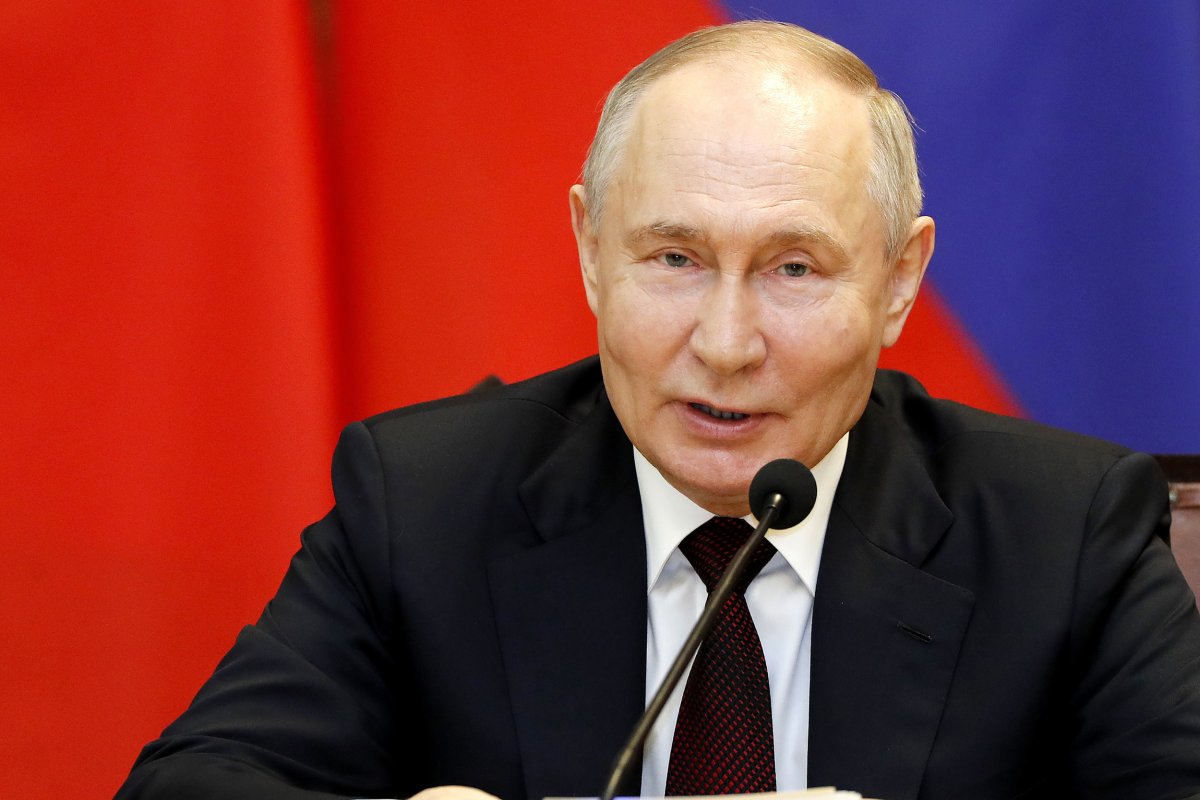
Putin speaks during a press briefing with Vietnamese President To Lam at the Presidential Palace in Hanoi
Putin speaks during a press briefing with Vietnamese President To Lam at the Presidential Palace in Hanoi
Minh Hoang/AP
Writing on X, he said: “This week alone, Russia has used more than 800 guided aerial bombs against Ukraine. Against our cities and communities, against our people, against everything that makes life normal”
Glide bombs are Soviet-era munitions that have been modified to include wings and navigation systems that allow for a gliding flight path to a target. The bombs can have a payload of 1.5 tonnes.
The gliding additions allow bombs to travel much further as the heavy weaponry is fitted with precision guidance systems and launched from an aircraft flying out of range of air defenses.
Ukraine dismissed allegations from Belarus that it was amassing troops to reinforce their shared border. The Belarusian Defence Ministry claimed on Sunday that Ukraine was moving troops and weapons to the border.
Border guard spokesman Andriy Demchenko told Ukrainian TV: “It is not the first time Belarus offers information about Ukraine presenting a threat and strengthening itself. This is another part of the information operation conducted by Belarus with support by Russia.
Do you have a story we should be covering? Do you have any questions about this article? Contact LiveNews@newsweek.com
Newsweek is committed to challenging conventional wisdom and finding connections in the search for common ground.
Newsweek is committed to challenging conventional wisdom and finding connections in the search for common ground.
A highly anticipated ruling by the Supreme Court that former presidents enjoy wide-ranging immunity for their official acts while in the White House was repeatedly praised by former President Trump in the hours after the high court’s blockbuster opinion.
“BRILLIANTLY WRITTEN AND WISE,” Trump wrote in a social media post about the ruling, which likely dealt a major blow to the ongoing prosecution of Trump on charges he aimed to subvert his 2020 election loss to President Biden.
“THE SUPREME COURT DECISION IS A MUCH MORE POWERFUL ONE THAN SOME HAD EXPECTED IT TO BE,” Trump spotlighted.
The move on Monday by the conservative-dominated court – including three justices nominated by Trump – means that the trial judge in the lower court case against Trump will now have to hold hearings on whether the charges against Trump were based on official acts by the then-president or unofficial ones.
WHAT TRUMP TOLD FOX NEWS ABOUT THE SUPREME COURT RULING
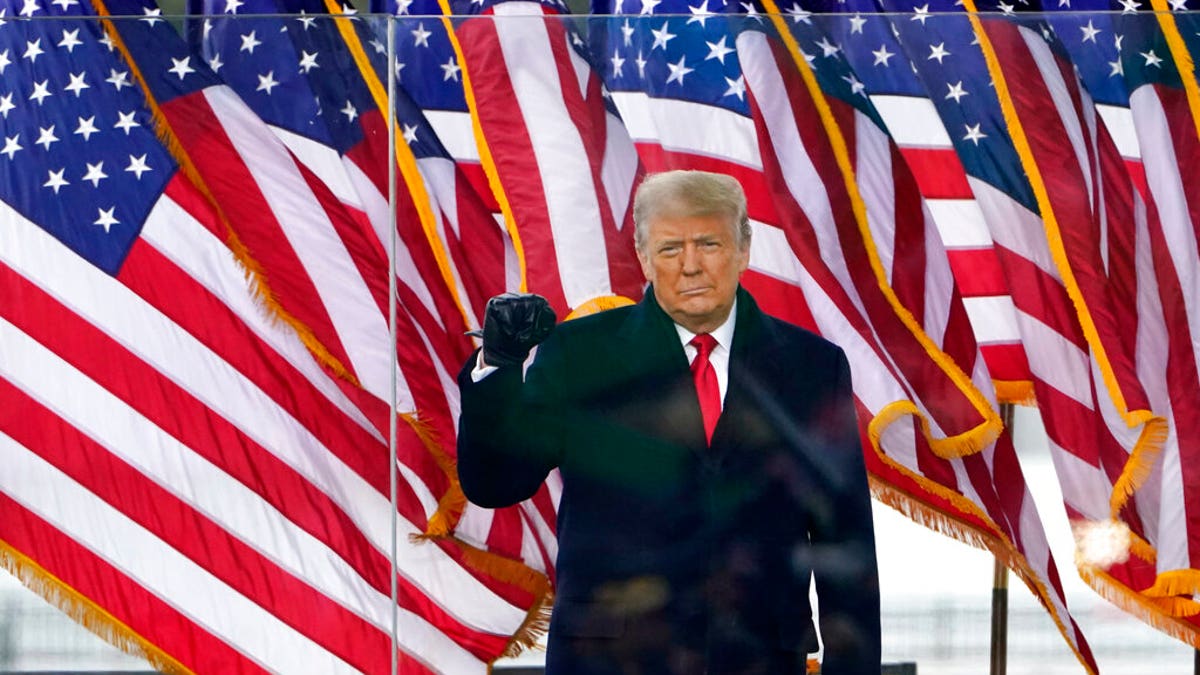
That process will take time, and it’s extremely unlikely Trump will go on trial for trying to overturn the 2020 election before voters cast ballots in the 2024 rematch between the former president and his Democratic successor.
Trump called it a “big win for our Constitution and for democracy” during an exclusive interview with Fox News’ Brooke Singman.
TRUMP IMMUNITY CASE: SUPREME COURT RULES EX-PRESIDENTS HAVE SUBSTANTIAL PROTECTION FROM PROSECUTION
But Biden principal deputy campaign manager Quentin Fulks, in a conference call with reporters, charged that “this decision will give Donald Trump cover to do exactly what he’s been saying he wants to do for months, which is enact revenge and retribution against his political enemies.”
“This is a pivotal moment for our country. The conservative justices on the court, three of whom are only there because of Donald Trump, just made it easier for him to pursue a path to a dictatorship,” Fulks argued.
A major question going forward is what kind of impact the Supreme Court ruling on presidential immunity will have on the Biden-Trump rematch with just over four months to go until the November election.
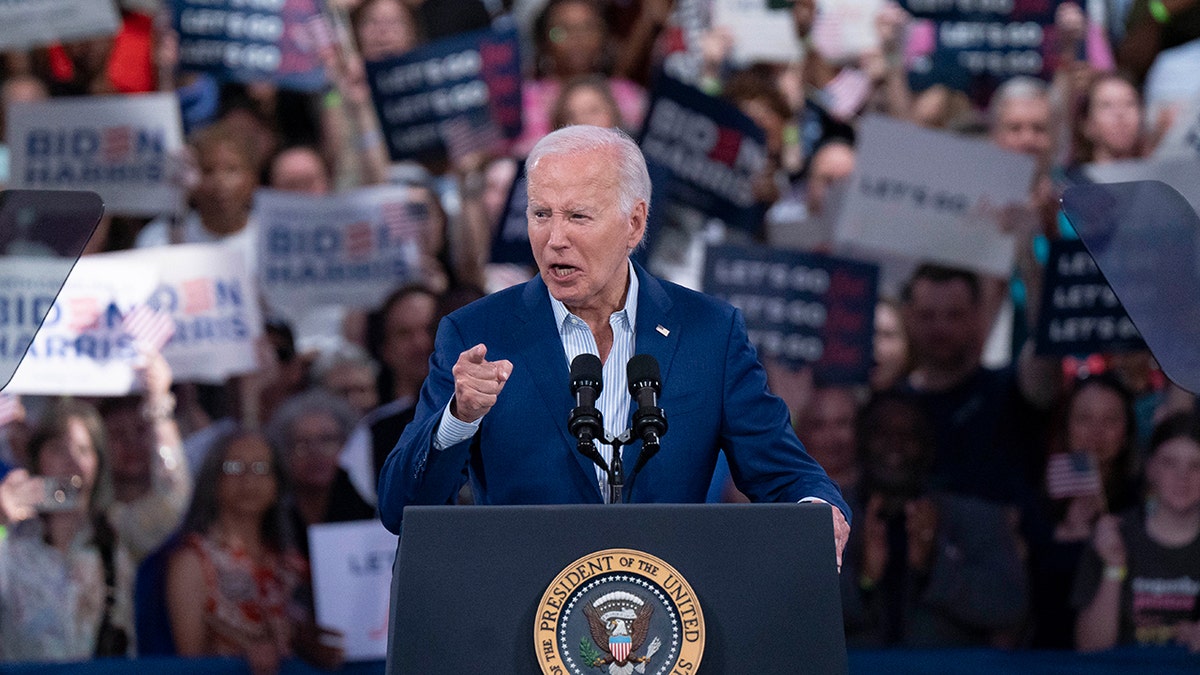
The president has long charged that Trump is a threat to democracy and his argument is a central tenant of his campaign for a second term in the White House.
And in an address Monday night, Biden hammered home the point.
“The American people must decide if Trump’s embrace of violence to preserve his power is acceptable. Perhaps most importantly, the American people must decide if they want to entrust the presidency to Donald Trump once again. Now knowing, he’ll be even more emboldened to do whatever he pleases, whenever he wants to do it,” the president emphasized.
Some Biden supporters see a silver lining in the move by the Supreme Court.
Longtime Democratic strategist and presidential campaign veteran Maria Carodona said the “ruling is a shot in the arm to voters who care about our democracy, our Constitution, and the rule of law. It is a shot in the arm for them to work their butts off to elect President Biden because the Supreme Court ruling was a victory for one person, Donald Trump, and it was a huge loss for the country, and our democracy.”
Voters need to understand that presidents matter when it comes to the make up of the court. Today’s dangerous decision that came out of the Trump-molded MAGA court is proof of that,” Cardona, a committee member on the Democratic National Committee, argued.
CLICK HERE TO GET THE FOX NEWS APP
Democratic strategist Joe Caiazzo, another veteran of multiple presidential campaigns, emphasized that voters will remember the ruling when they cast their ballot in the autumn.
“The stakes of the election continue to grow as this activist court has attacked reproductive rights, environmental protection and now the integrity of the ability to hold elected officials accountable for their actions. Voters will remember this in November,” Caiazzo said.

But longtime Republican consultant and communicator Ryan Williams, who served on a handful of GOP presidential campaigns, spotlighted that the ruling “makes it less likely Trump will be in courtrooms before the election. That’s a win for Trump.”
“The general consensus was that the more serious charges were in the federal cases and by moving them to after the election, they are removed as a distraction during the campaign,” Ryan added. “Trump can now continue to campaign and focus on the election rather than preparing for trial prior to Election Day. That’s a win for him.”
Get the latest updates from the 2024 campaign trail, exclusive interviews and more at our Fox News Digital election hub.
US supreme court rules Trump has ‘absolute immunity’ for official acts | US supreme court | The Guardian https://t.co/6xwrygYkHV
— Michael Novakhov (@mikenov) July 2, 2024
Steve Bannon Press Conference Outside Prison Ends in Total Disaster | The New Republic https://t.co/20B0G4O8fw
— Michael Novakhov (@mikenov) July 2, 2024
Israel conscription rule stokes ultra-Orthodox fury https://t.co/RC8P3mSJ38 pic.twitter.com/hj7cQjO56u
— Michael Novakhov (@mikenov) July 2, 2024
7 hours ago
By Yolande Knell, BBC Middle East correspondent

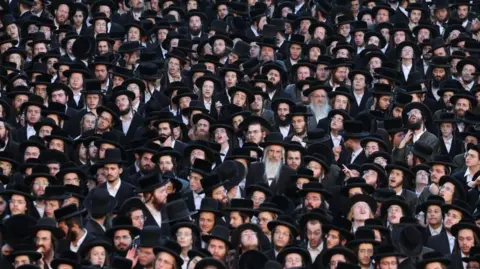 EPA
EPAUltra-Orthodox Jews in full time study have been exempt from conscription since the beginning of the state
When Israel’s ultra-Orthodox or Haredi Jewish community gathers in force you realise just how large it is.
Thousands of men and boys dressed in black and white are crammed into the streets of Mea Shearim – which is the heart of the ultra-Orthodox community – in Jerusalem for an angry protest against the military draft.
It is the latest demonstration since the Supreme Court’s historic ruling that young Haredi men must be conscripted into the Israeli military and are no longer eligible for significant government benefits.
Young men who are full-time students in Jewish seminaries, or yeshivas, tell me that their religious lifestyle is in jeopardy. They believe that their prayers and spiritual learning are what protects Israel and the Jewish people.
“For 2,000 years we’ve been persecuted, and we’ve survived because we’re learning Torah and now the Supreme Court wants to remove this from us, and it will cause our destruction,” says Joseph.
“Going to the army will make a frum – religious Jew – not religious anymore.”
“The draft does not help militarily. They don’t want us Haredim, us orthodox Jews, they don’t need us,” another student tells me, withholding his name as he does not have his rabbi’s permission to give an interview.
“They’re just gonna give us some dirty job there. They’re there to make us not Orthodox no longer.”

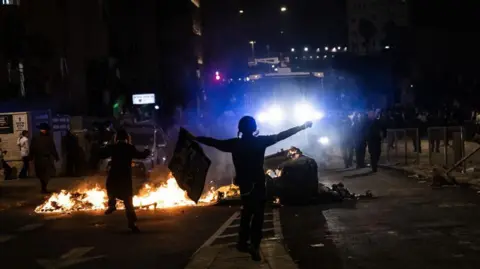 Anadolu via Getty Images
Anadolu via Getty ImagesClashes erupted in Jerusalem between Israeli police and ultra-Orthodox Jews over the weekend
For decades, there has been controversy over the role of the ultra-Orthodox in Israeli society. From a small minority, the community is now a million-strong, making up 12.9% of the population.
Ultra-Orthodox parties have often acted as kingmakers in Israeli politics, giving support to successive governments headed by Israel’s prime minister Benjamin Netanyahu, in return for continuing the draft exemption and hundreds of millions of dollars for their institutions.
This has been a long-standing cause of friction with secular Jewish Israelis who mostly do compulsory military service and pay the largest share of taxes. But the issue has now come to a head at the most sensitive time as the army faces unprecedented strain following its longest ever war in Gaza, and a possible second war with Hezbollah in Lebanon.
“My son has already been in the reserves for 200 days! How many years do you want him to do? How are you not ashamed?” demanded Mor Shamgar as she berated Israel’s national security adviser at a recent conference in Herzliya.
Her exasperated rant about her son – serving as a tank commander in southern Israel – was widely shared on social media.
With army leaders complaining about a shortage of military manpower, Ms Shamgar – who says she has previously voted for the prime minister’s party – believes that the government has “handled the situation very poorly,” putting its own political survival ahead of national interests on the draft issue.
“Netanyahu and his gang made a major judgement mistake on thinking they can dodge it,” she tells me. “Because once you enforce on half the population that you have to go to the army, you cannot enforce that the other half will not go to the army. It’s not even secular versus religion. I see it as an equality issue. You can’t make laws that make half a population, second grade citizens.”
Earlier this year, a survey by the Israel Democracy Institute indicated that 70% of Israeli Jews wanted to end the blanket exemptions from military service for the ultra-Orthodox.
Despite earlier threats, so far ultra-Orthodox parties have not left the governing coalition over army conscription. Attempts continue to push forward an older bill – once rejected by Haredi leaders – that would lead to partial enlistment of their community.
At an ultra-Orthodox synagogue in Jerusalem, men of different ages are draped in their prayer shawls gathering for the morning service. Their conservative way of life is based on a strict interpretation of Jewish law and customs.
So far, just one Israeli army battalion, Netzah Yehuda, was set up specifically to accommodate ultra-Orthodox demands for gender segregation with special requirements for kosher food, and time set aside for prayers and daily rites.


Rabbi Yehoshua Pfeffer has called on the army to improve its relationship with the ultra-Orthodox community
But an ultra-Orthodox rabbi who works on issues of integration and is on the board of an NGO that supports the battalion, believes more compromises are possible and that a new Haredi brigade should be formed.
“It’s up to the Haredim to come to the table and say, we’re ready for real concessions, we’re ready to step out of our traditional comfort zone and do something proactive in finding the right framework that will allow more Haredi to serve,” says Rabbi Yehoshua Pfeffer.
He suggests thousands of young ultra-Orthodox men who do not currently do full-time Torah study – finding themselves unsuited to academic rigours – should be encouraged to join the army like other Jewish Israelis their age.
For the Israeli military to live up to its reputation as “the People’s Army,” Rabbi Pfeffer also calls on it to do more to build trust and improve its relationship with his community. “There are a lot of accommodations needed, but they’re not rocket science,” he comments.
So far, the process of implementing the ultra-Orthodox draft appears gradual.
More than 60,000 ultra-Orthodox men are registered as yeshiva students and have been receiving an exemption from military service. But since last week’s Supreme Court ruling, the army has only been told to draft an additional 3,000 from the community, in addition to about 1,500 who already serve. It has also been told to devise plans to recruit larger numbers in coming years.
Back in Mea Shearim, after nightfall there are some protesters who take an extreme position, throwing stones at the police and spreading out in Jerusalem to attack the cars of two ultra-Orthodox politicians who they feel have let them down on military conscription.
Historically, this is an insulated section of society that resists change but now amid rising public pressure in Israel and the possibility of widening war, change appears unavoidable.
Russia, China, and the Ukraine war – Google Search https://t.co/1xXLVHJd3G https://t.co/hjcXdkLykF
— Michael Novakhov (@mikenov) July 2, 2024
Western leaders are becoming increasingly frustrated by China’s role in enabling the war in Ukraine. Some have even openly threatened to sanction the country if it continues to provide Russia with the materials it needs to build more weapons.
And they are right to focus on China’s position of power. Russia is now so dependent on the only major economy still taking the risk to support its regime, that China could effectively force Vladimir Putin to end the conflict.
The extent of Russia’s economic dependence became apparent fairly quickly after its full-scale invasion of Ukraine in February 2022. Just a few months later, things were not going to plan.
In the hope of putting pressure on European countries supporting Ukraine, Russia decided to cut almost all of its exports of gas to the west. Before the war, Russia had provided about 40% of Europe’s gas.
While at first that decision provoked an energy crisis and a surge in bills across the continent, Europe eventually managed to wean itself from Russia’s supply. They did this in part by replacing gas with other sources of energy, but also by substituting Russian imports with gas from other countries, including the US.
Electricity prices in Europe are now roughly back to pre-war levels. And while gas prices are still high, they have dropped, with storage facilities expected to be almost full later this year.
So now Russia faces a massive problem of its own: selling its gas.
For the first time in over 20 years, the Russian state-owned energy giant Gazprom sustained a financial loss in 2023. Until then, the custom and tax revenues from the company contributed around 10% of the country’s budget.
Revenue from oil exports has also decreased. As western countries have banned Russian oil, the country is forced to sell it for less, absorbing the additional costs of transporting production to the likes of China and India while mainstream transporters refuse to risk carrying it.
As for natural gas, geography makes things even worse for Russia. China is the only potential customer large enough to justify a new pipeline to replace the ones which used to deliver to Europe. But given this privileged position, China feels able to demand the gas at a huge discount.
In this kind of bargaining situation, China has the upper hand.
China can buy gas from anywhere in the world, but Russia can only sell it (at the volumes it needs) to China. Then there is the question of urgency – Russia needs to finance a war now, while China has no pressing energy need it cannot fulfil.
Bargaining basement
Russia’s dependence on China applies to other sectors of the economy too. The Chinese yuan now accounts for 54% of trades in Russia’s stock exchange since it was cut off from the global banking system in 2022. It has no credible alternative to replace that money if China started to apply similar sanctions.
Even more crucial for the war, China is responsible for around 90% of Russia’s import of “high priority” dual-use goods – electronic components, radars, sensors – without which it could not build advanced military hardware. Again, there is no alternative supplier.
It is hard to win a war with only North Korea and Iran – two countries themselves subject to heavy economic sanctions – on your side. In short, this means that China is now in a position to demand anything from Russia.
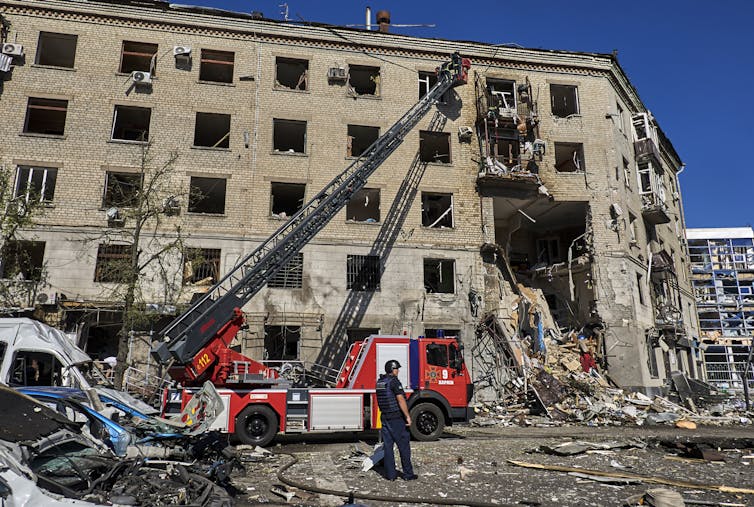
Aftermath of a June 2024 bomb attack in Ukraine. EPA-EFE/SERGEY KOZLOV
And in potential negotiations between China and the west, both have much to gain – and a similar bargaining position to each other.
For example, China is facing considerable domestic economic problems of its own. One of these stems from industrial overcapacity and the need to find buyers for all the products it manufactures.
But the US has just imposed a 100% border tax on electric cars from China, and 50% on solar cells. The EU is doing something similar and considering asking Chinese firms to make electric vehicles in Europe, sharing their technology.
Taxing cheap products which could reduce carbon emissions may seem like a self-defeating strategy given the urgent need to finance the energy transition. So perhaps the west wants to avoid becoming too dependent on China, for the same bargaining reasons that make Russia’s current position so weak.
But the balance is not the same. China needs western markets, and the west need China’s green industrial capacity and know-how, as the country now installs more renewable capacity every year than the rest of the world combined.
Europe is still facing difficult economic times, and a tariff is essentially an extra tax burden on European consumers. Everyone would benefit from the trade war toning down, and China has something very valuable to offer. For to all intents and purposes, it now owns Russia, and could use this power to end the war in Ukraine.
Wir wünschen uns eine starke polnische Stimme in Europa, denn die Sicherheit unserer Länder ist untrennbar verbunden. Dafür stehen wir ein, als Nachbarn, als NATO-Alliierte und als EU-Partner. Lieber @donaldtusk, vielen Dank für die konstruktiven Regierungskonsultationen! pic.twitter.com/2MFgsvffsj
— Bundeskanzler Olaf Scholz (@Bundeskanzler) July 2, 2024
